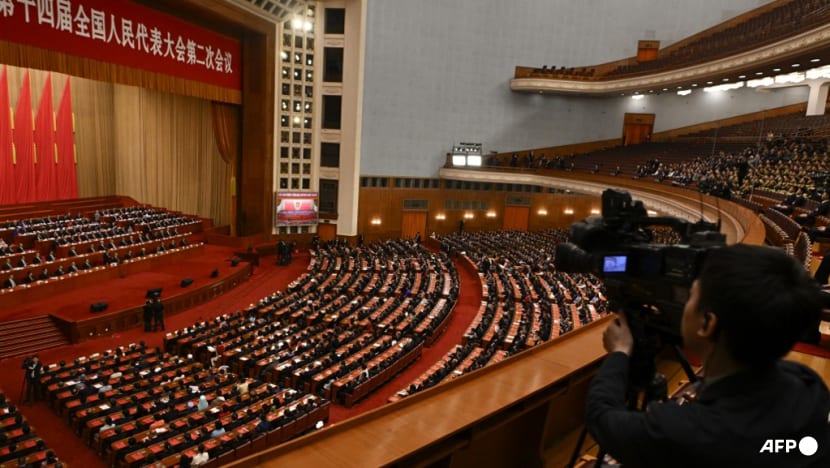Xi urges head-on approach for China amid external threats ahead of annual two sessions
The Chinese president's comments come after a high-level Politburo meeting focused on reviewing the government work report, which will lay out China's economic growth target and key priorities for this year.

Delegates attend the closing session of the 14th National People's Congress (NPC) at the Great Hall of the People in Beijing on Mar 11, 2024. (Photo: AFP/Wang Zhao)

This audio is generated by an AI tool.
Chinese President Xi Jinping has called on the nation to “face difficulties head-on and strengthen confidence” amid mounting external challenges, while highlighting the crucial decision-making of the party’s Central Committee in steering the country’s economic work.
His comments, included in the latest Communist Party magazine Qiushi to be issued on Saturday (Mar 1), came after the release of a readout from a meeting of the party’s Politburo, which has doubled down on economic stability and quality development with tech advancements in the country’s economic work in 2025.
“Centralised and unified leadership by the Party Central Committee is the fundamental guarantee for effective economic work,” Xi said in the publication, according to Xinhua on Friday.
“At critical moments and key junctures, the Party Central Committee promptly assesses the situation and makes strategic decisions, ensuring that China’s economic ship sails through the winds and waves, moving steadily towards the future.”
The statements were released after US President Donald Trump said on Thursday that the US would not only impose his originally outlined 10 per cent tariffs on all Chinese imports beginning on Tuesday, but that these were to be doubled for an effective rate of 20 per cent.
Some of the top priorities for economic work, according to Xi, include ensuring an effective relationship between the market and the government, balancing demand and supply, enhancing resource-allocation efficiency, and pursuing both quality and scale in development.
He also emphasised that technology should be the leading force for development and pledged to vigorously cultivate and expand the emerging and future industries, facilitating a smooth transition between old and new growth engines.
On the same day, the Communist Party’s 24-member Politburo met in the lead up to the “two sessions”, the annual meetings of the National People’s Congress (NPC), China’s legislature, and the Chinese People’s Political Consultative Conference (CPPCC), the country’s top advisory body, which will begin in Beijing next week.
“(We will) implement more proactive macro policies, expand domestic demand, and foster the integration of tech and industrial innovation,” according to a readout of the meeting reported by Xinhua on Friday.
The government also reaffirmed its intention to stabilise the real-estate and stock markets, raise people’s standard of living, and continue to promote high-level opening up.
“(We will) prevent and resolve risks in key areas and the external shocks, stabilise expectations, stimulate vitality, and drive continuous economic recovery and improvements,” the readout said.
Ding Shuang, chief Greater China economist at Standard Chartered Bank, said that rather than introducing new policy directions, the readout served more as a reiteration of the previous policy trajectory outlined during the central economic work conference in December.
“Technological innovation has always been a key focus for Beijing,” Ding said. “It was placed at the forefront of last year’s government work report, and at the December economic work conference, it was moved to second place, just behind boosting consumption.”
In the face of higher tariffs, exports are poised to be negatively affected, but analysts have pointed out that this damage is manageable through macroeconomic policies.
“I expect Beijing will raise the fiscal deficit to 4 per cent this year at the National People’s Congress next week. Moreover, the fiscal deficit can be revised up later this year if China faces other economic challenges such as even higher tariffs in the US,” said Zhang Zhiwei, president and chief economist of Pinpoint Asset Management.
Zhang said that the increased fiscal deficit, which would contribute to boosting domestic demand, will be part of Chinese policymakers’ strategy to manage the impact of tariff hikes. More details are expected to be released at next week’s NPC meeting.
The Politburo meeting primarily focused on reviewing the government work report that Premier Li Qiang will deliver at the NPC meeting. The report is expected to outline China’s economic growth target and key priorities for this year – the final year of the 14th five-year plan.
The CPPCC meeting will begin on Tuesday, and the NPC meeting will begin on Wednesday.
“The highlight of the NPC may be on technology,” Zhang added. “The DeepSeek shock has boosted confidence in China. All local governments have already held their version of the People’s Congress. And they all highlighted the importance of promoting the tech sector.
“On consumption, I expect the fiscal subsidies will be extended to a wider range of goods and services. There could be more subsidies to boost fertility, and higher pension payments, though the details may not be released at the NPC.”
China’s economy grew by 5 per cent last year, fuelled by a surge in exports and stimulus measures rolled out since late September. However, it faces challenges, including tepid consumer spending, a prolonged property slump, changing demographics and sluggish business confidence.
In a meeting with top entrepreneurs on Feb 17, President Xi reiterated his commitment to bolstering support for the private sector while urging businesses to play a bigger role in driving technological innovation amid growing rivalry with the United States.
It was Xi’s first high-profile meeting with representatives of the private sector since 2018. A regulatory crackdown launched by Beijing in 2021 and anti-monopoly investigations targeting the “platform economy” have dented business confidence, with a private sector downturn contributing to weaker local government revenues and rising youth unemployment.
To improve market sentiment, Beijing has taken steps to ease investment barriers and revise the negative list for private sector market access.
It has also sought to rein in excessive regulatory enforcement, and the latest draft of a new private economy promotion law aims to ban arbitrary fines on businesses that lack a legal basis.
Supporting domestic demand is another key priority for the government this year, particularly as the likelihood of an increase in tariff disputes with the US will compel China to increasingly rely on its domestic economy to sustain growth.
The country is expanding its nationwide consumer trade-in programme to encompass more home appliances and digital devices. The premier has also pledged to increase household incomes to stimulate domestic consumption.
The government has also vowed to improve the consumer environment by cracking down on fraud, substandard goods, and other factors that “dampen spending confidence”.
“We must prioritise consumption, leveraging it as a key driver to expand domestic demand, unblock the economic cycle and fuel economic growth,” Li told a State Council study session last week.
This article was first published on SCMP.


















